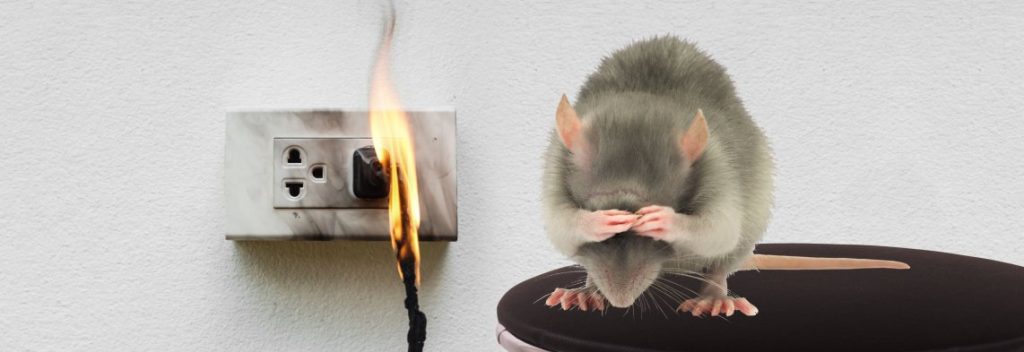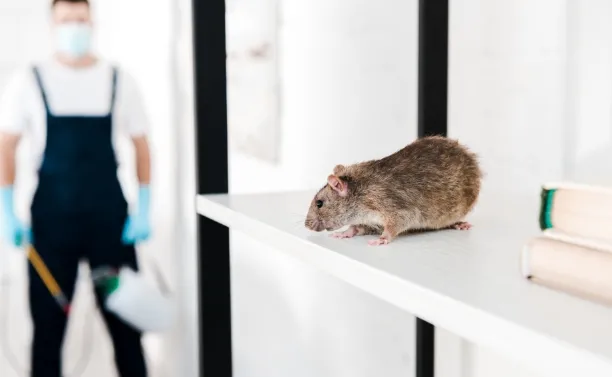Rat Control (Rats)
Get Free Quote
What are Rats?
Rats are rodents belonging to the genus Rattus, known for their sharp teeth, long tails, and adaptable nature. These intelligent and resourceful mammals are found worldwide, thriving in various habitats ranging from urban environments to rural landscapes. Rats are prolific breeders, with females capable of producing several litters per year, each containing multiple offspring. They are opportunistic feeders, consuming a diverse diet that includes grains, fruits, vegetables, insects, and even small animals. Rats are primarily nocturnal, preferring to forage and explore under the cover of darkness, which can make them challenging to detect and control.
Rats are often mistaken for other rodent species, such as mice or voles, due to their similar appearance and behavior. However, rats can be distinguished by their larger size, with adult rats typically measuring between 6 to 9 inches in length, excluding their tails. Additionally, rats have longer tails compared to mice and other rodents, which are typically scaly and devoid of fur. While both rats and mice can pose significant pest control challenges, rats are generally more destructive and pose greater health risks due to their larger size, stronger gnawing ability, and potential to transmit diseases. Effective rat control measures require a thorough understanding of rat behavior, habitat preferences, and population dynamics to implement targeted strategies for prevention and eradication.
Common Causes of Rats in SA
In South Africa, rats are ubiquitous pests that can infiltrate homes, businesses, and agricultural settings, posing significant health and economic risks. One of the primary causes of rat infestations is poor sanitation and waste management practices. Rats are attracted to areas with abundant food sources, including uncovered garbage bins, food scraps, and organic waste. In urban areas, improper disposal of household refuse and inadequate sanitation infrastructure can create ideal conditions for rat populations to thrive. Similarly, in rural settings, improper storage and handling of agricultural products can attract rats, leading to infestations that jeopardize food security and livelihoods.
Another common cause of rat infestations in South Africa is inadequate pest control measures and infrastructure. Despite efforts to control rat populations through baiting programs, trapping, and rodent-proofing, many communities and municipalities struggle to effectively manage rat infestations. Limited resources, lack of public awareness, and challenges in implementing sustainable pest control strategies contribute to ongoing rat problems in both urban and rural areas. Additionally, rapid urbanization and expansion of informal settlements create new habitats and opportunities for rats to proliferate, exacerbating the problem.
Climate change and environmental factors also play a role in rat infestations in South Africa. Warmer temperatures and changing weather patterns can influence rat behavior, reproduction rates, and habitat suitability. Increased rainfall and flooding events can displace rat populations, driving them to seek refuge in human habitats. Furthermore, changes in agricultural practices, such as monoculture farming and deforestation, can disrupt natural ecosystems and provide rats with new opportunities to exploit resources. Addressing the root causes of rat infestations in South Africa requires a multifaceted approach that integrates sanitation improvements, effective pest control measures, and sustainable environmental management practices.

Risks Associated with Rats
Rats pose significant risks to human health, property, and the environment, making effective rat control essential for mitigating these hazards. One of the most pressing concerns associated with rats is the transmission of diseases. Rats are known vectors for various pathogens, including bacteria, viruses, and parasites, that can cause serious illnesses in humans. Diseases transmitted by rats include leptospirosis, salmonellosis, hantavirus pulmonary syndrome, rat-bite fever, and plague. These diseases can be contracted through direct contact with rats, their urine, feces, or saliva, or indirectly through contaminated food, water, or surfaces.
In addition to disease transmission, rats can cause extensive damage to property and infrastructure. Rats are prolific gnawers with strong teeth capable of chewing through wood, plastic, wiring, and even concrete. Their gnawing behavior can lead to structural damage to buildings, electrical fires caused by damaged wiring, and loss of stored goods in homes, warehouses, and agricultural facilities. Rats also pose a threat to food security and agricultural production by consuming and contaminating crops, stored grain, and livestock feed. Furthermore, their burrowing activities can undermine foundations, roads, and levees, increasing the risk of erosion, flooding, and property damage.
Request A Free Quote
What are the steps to Rat Control For Home or Office?

Implementing effective rat control measures in homes or offices in South Africa requires a systematic approach tailored to the specific environment and circumstances. Here are the key steps:
Identification and Assessment: Begin by identifying signs of rat activity, such as droppings, gnaw marks, grease smudges, and burrows. Assess the extent of the infestation and determine potential entry points, nesting areas, and food sources.
Sanitation and Exclusion: Improve sanitation practices by removing food and water sources that attract rats. Store food in sealed containers, clean up spills promptly, and ensure proper waste management. Seal gaps, cracks, and openings in walls, floors, and foundations to prevent rats from entering buildings.
Trapping and Baiting: Set up rat traps or bait stations in strategic locations based on observed activity and entry points. Use snap traps, glue boards, or electronic traps to capture rats effectively. Bait stations can be used to dispense rodenticides in areas inaccessible to children, pets, and non-target animals.
Environmental Modifications: Make environmental modifications to deter rats from nesting and foraging. Trim vegetation away from buildings, remove clutter and debris from yards and storage areas, and secure outdoor garbage bins with tight-fitting lids.
Professional Pest Control: Consider hiring a licensed pest control professional with experience in rat control for more extensive or persistent infestations. Pest control experts can conduct thorough inspections, implement targeted treatments, and provide ongoing monitoring and maintenance to ensure effective rat control.
Monitoring and Prevention: Regularly monitor for signs of rat activity and adjust control measures as needed. Conduct routine inspections of buildings, yards, and surrounding areas to identify and address potential vulnerabilities. Implement preventive measures, such as exclusionary practices and habitat modifications, to minimize the risk of future rat infestations.
By following these steps and adopting a proactive approach to rat control, homeowners and businesses in South Africa can effectively manage rat infestations and create safer, healthier environments for occupants. It’s essential to address rat problems promptly and comprehensively to prevent property damage, contamination, and health risks associated with rat activity.
Accend Solutions is Available 24/7 for Emergency Pest Control including Rat Control in Gauteng and North-West Provinces in South Africa.
email: info@accend.co.za
call: 068 474 7303
FAQs on Rat Control
We know you may have questions about Rats in general and how Pest Control for Rats work. We have compiled a few FAQs on Rats that might clear the confusion.
CLICK HERE FOR FAQs ON RATS/RAT CONTROL
Q: What are the common signs of a rat infestation in South Africa?
A: Common signs of a rat infestation include droppings, gnaw marks on food packaging or structural materials, grease marks along walls and baseboards, burrows or nests in outdoor areas, and the presence of live or dead rats. Rats are nocturnal and often hide during the day, so sightings may be limited to nighttime activity.
Q: What health risks are associated with rat infestations?
A: Rat infestations pose significant health risks due to the potential transmission of diseases. Rats can carry and spread various pathogens, including bacteria, viruses, and parasites, through their urine, feces, and saliva. Diseases transmitted by rats include leptospirosis, salmonellosis, hantavirus, rat-bite fever, and plague. Additionally, rats can contaminate food and surfaces with pathogens, leading to foodborne illness and other health problems.
Q: How can I prevent rat infestations in my home or business?
A: Preventing rat infestations requires implementing proactive measures to eliminate food, water, and shelter sources that attract rats. Practice good sanitation by keeping food stored in sealed containers, cleaning up spills promptly, and maintaining clean and clutter-free environments. Seal gaps, cracks, and openings in walls, floors, and foundations to prevent rats from entering buildings. Trim vegetation away from structures and secure outdoor garbage bins with tight-fitting lids to deter rats from foraging in outdoor areas.
Q: What types of rat control services does Accend Solutions offer in South Africa?
A: Accend Solutions offers a range of rat control services tailored to the specific needs of each client. Our services include thorough inspections to identify signs of rat activity and assess the extent of infestations, implementation of targeted treatments using traps, baits, and other control methods, and ongoing monitoring and maintenance to ensure long-term rat control and prevention. We utilize safe and effective pest control products and techniques to protect the health and safety of our clients and their environments.
Q: Is rat control safe for humans and pets?
A: Yes, Accend Solutions prioritizes the safety of our clients, their families, and their pets. We use EPA-approved products and follow strict safety protocols to minimize risks to humans and animals during rat control treatments. Our trained technicians are knowledgeable in the proper application of treatments and take precautions to ensure the safety of everyone involved.
Q: How quickly can Accend Solutions respond to a rat infestation?
A: Accend Solutions understands the urgency of rat infestations and strives to respond promptly to service requests. Our team of trained professionals is equipped to handle rat infestations of varying sizes and complexities, and we prioritize timely and effective solutions to address our clients’ pest control needs.
If you have any further questions or concerns about rats or rat control services, please don’t hesitate to contact us. We’re here to help!
